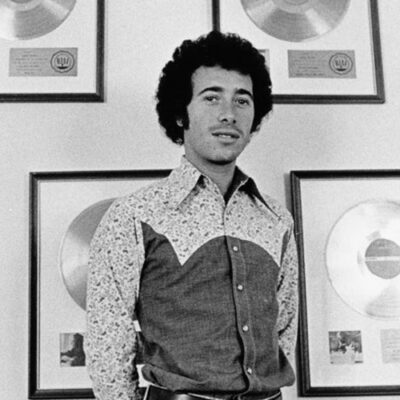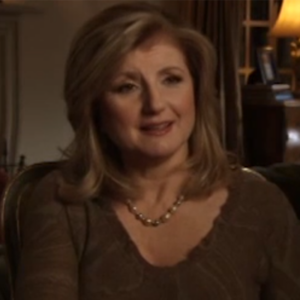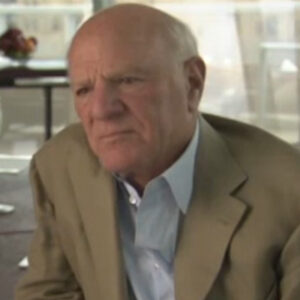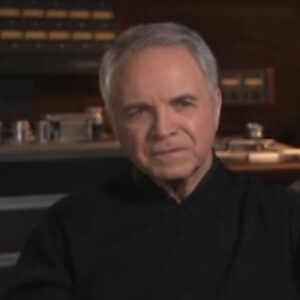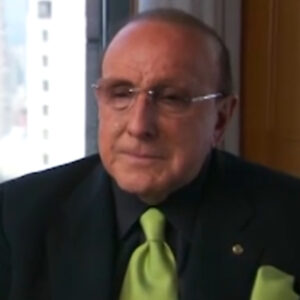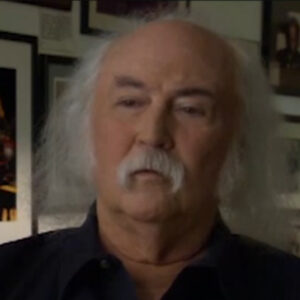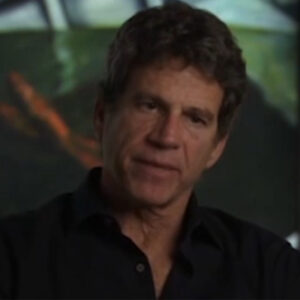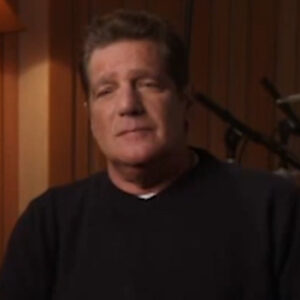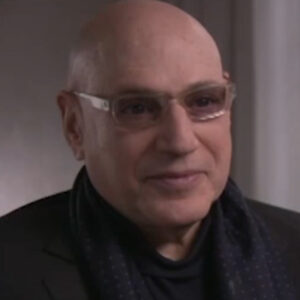Speaker I’ll give you the truthful answer. I have no recollection as to how I met him, nor do I remember since I don’t remember how I met him. Any first impression of him, would you? It seems as if I’ve always known him.
Speaker What are some of your memories? I mean, what are some of the most immediate memories and thoughts of that day?
Speaker I think one of the first periods that I met David was when he was teaching at UCLA. It’s my understanding that he had been diagnosed with some type of cancer and really believe that he was some how terminal and he had taken this job. At UCLA teaching and we had lunch a few times.
Speaker How it is that I first met him, as I say, I don’t remember.
Speaker What did you mean? I would imagine that your primary, your friends, I guess, but your primary business connection was with the sale. No, no.
Speaker So tell me, because I consider him a very close friend. And like other people that are there very I have very few friends. I’ll lie down and you can do a psycho study on me. David is not the kind of friend that today I talk to every day or see all that frequently. But I know that if I ever needed something, I could call David and he would be there with you. And he knows that about me.
Speaker And to me, that’s part of the definition of friendship, particularly among men. Women may be different.
Speaker But I consider myself a friend of his having nothing to do with the sale of Geffen Records. It’s an interesting story, but it’s.
Speaker But I was saying I understand that your friendship goes beyond that. But your primary connection from a business standpoint was with the sale.
Speaker From a business standpoint, I guess you’d say that that’s the case.
Speaker Well, let’s talk about that. When did when did you how did that come about? And that was in 1990.
Speaker Today that you’ve already helped me.
Speaker When did you what how did this the whole story how did this happen?
Speaker Well, what happened was that one day David called me and he asked whether he could come see me and his deal with Warner Brothers or some Warner Music entity had terminated, as I recollect. And he was upset at Warner’s. And he had had some discussions with EMI.
Speaker And from our company’s perspective, we were never strong in the music business, in our music business was more or less limited to certain important pop stars like Olivia Newton, John and Elton John and. Few people like that, Neil Diamond and Country. We were a major force in country, but we really weren’t in the rock n roll business in a meaningful way.
Speaker And that was important because whether or not rock n roll will never die, I’m not able to tell you, but it sure as hell has lasted longer than I thought it would.
Speaker Anyhow, David came over to my house and he had been, as I say, negotiating with I guess the man’s name was Colin Southgate, who was head of EMI, and he was troubled by certain things that were going on in that negotiation.
Speaker And.
Speaker We were very anxious to develop and have artists that would be helpful to us, not only in terms of filling out our record company, but equally importantly, in terms of giving us the ability to open foreign record companies because we were in a position where we were basically licensing laws, not principles. And that meant we weren’t developing foreign artists and so on. And we felt that with the Geffen records.
Speaker Catalog of artists and reputation.
Speaker That that would be helpful to us.
Speaker And I don’t remember exactly how it came about, but it came about that we we made a decision that we wanted to try to buy Geffen Records now. There’s a dispute between David and myself as to whether certain things happened by fax or by phone call, but I don’t believe there’s any dispute as to what happened.
Speaker The we made a decision as to what we were going to propose. And it was a very favorable deal from David standpoint, in my opinion. And we made him this proposal, in my opinion, by fax. And. It was a very simple proposal. I think it was about two paragraphs. He probably has a copy of it someplace, and he called me up approximately two minutes later and he says to me something like, Can I get more?
Speaker I said, No, David, you can’t get more. This is it. He says, I’ll take it.
Speaker And.
Speaker I don’t want to go into what the offer was, I think that’s probably public knowledge, but I don’t want to get into it. I will only tell you this little caveat. He asked me. We all felt that the company would sell and the deal that was made was made in stock. It actually made him the largest shareholder of MCI equal, no larger, larger than Lou. Anyhow, the what was I saying, it was like, oh, yes, it was kind of an amusing byproduct to this deal. We we had to get a paper signed.
Speaker And as I recollect, David hired our investment bankers.
Speaker But why? Why?
Speaker By the way, one needs investment bankers in these transactions is something I’ve never understood, which is which, if you include in the interview, will endear me to all investment bankers forever. But I’ve never seen their value at this kind of situation.
Speaker In any event, we had a meeting and going over the contracts and his investment bankers or lawyers in.
Speaker Had a whole list of things. And.
Speaker They started to go over this list. And when they went to item one, he said, forget it. They went to item two, he said, forget it. They went to item three, said, forget it. Finally, he said, well said. Wait a minute. Let me ask a question.
Speaker If I agree to all these outstanding points, how much is it worth? And they said, oh, probably at a maximum million dollars. He said, you want to know something? This is I agreed everything. That’s a true story and it proves how smart he is. He wasn’t going to blow this deal on what happens if a fire takes place and something burns down and.
Speaker I think one of the things he knew as part of the deal, he agreed to run Geffen Records for a period of five years.
Speaker And during this period of five years, he he wanted to know what what what would what did we really expect him to do? And I said, well, that’s simply said I’m as an employment agreement with you would be very simple. It’ll say you will do whatever it is you’ve been doing. And if you’ve been doing nothing, I guess you’ll do nothing.
Speaker And.
Speaker We went to the five years we never had an argument. We had a good business experience.
Speaker I never finished a story I was tearing, telling earlier, which will create a slight editing problem for you if you use it.
Speaker But. The.
Speaker Well, and I’m going to go into it. It’s not worth. No, it’s not worth it. Well, what was it? I’m not gonna go into it, so I’m not going to tell you what it was.
Speaker Well, you would be very helpful if you could say something about.
Speaker That in nineteen eighty nine, I think I’m on.
Speaker I will tell you what it is because I think I’m trying to think of any reason not to really. He asked me at the time the deal was made. He said, look, we all know that at some point this company is gonna get sold.
Speaker Well, we really didn’t know that, but it was a good possibility Lou was getting on. I didn’t want to put together a group to buy it because I had a modest thirty five years of. Worrying about whether pictures are going to open, records are going to sell or books are going to get red. And contrary to what some people think. There there’s a lot of fun you can have in the business, but it’s a very tough. Not very glamorous business, from my perspective. I read about all this glamour and I see the pictures, I never lived it, but I, I gave them a number. And I said, I think it’s going to sell for such and such a price. Round that area. And when it came time and we ultimately did make a deal, the deal nearly fell apart on two or three occasions. But we held out for a certain. Well, no.
Speaker And the truth of matter is that one of the main motivations that I had in getting that number versus a nickel less is that I knew that if we didn’t get that number, David would say, what happened to the number?
Speaker That’s a good story. Eddie would have you would never have gotten over that would have forgotten. He was pleased. You’re right.
Speaker That’s a very good story, though, that it would be helpful if you could say a little bit of the stages in 1989. I think getting records was the a successful record. Companies in the world, if not the most, had over two hundred and twenty five million dollars in sales. So it was it was a good company to buy. Could you set that stage? We knew there would just be helpful.
Speaker Well, it certainly was not large. It had a reputation of getting certain cutting edge artists. There were those people around town that thought that some of their artists were getting older and more expensive than they should be.
Speaker But there weren’t there aren’t a lot of record companies one could go about buying and.
Speaker There’s a whole story about another record company that we nearly but we, including Geffen Records, nearly bought later after we were acquired by the Japanese. And I think the deal was important. DMCA, whether or not if somebody did a business school analysis, it was financially good. I don’t know. I know it put us in a position of being aggressive and active and it permitted us to do things foreign. And it enabled later history to develop, which neither I nor David had much to do with. So as right now, a couple of interesting things. The only company that I know of that exists with the name Universal on it is the music company. The president of the music company is still one of the people we hired called Zac Horowitz. Whom you might consider interviewing. He’s a very professional, good guy. And by my definition, I think the deal was a good deal. I would do it again if I had the opportunity.
Speaker At that time, the deal was he had stock. He didn’t really was really liquid asset.
Speaker Well, I don’t remember the terms under which he could sell it.
Speaker It was a pretty good asset.
Speaker I mean, stock and MCI was not MCI notwithstanding, some of its later critics was, in my biased opinion, pretty well run company, a pretty conservative company. It was one of those companies where it was really run like a private company. I mean, we we. We were scrupulously careful in spending a nickel as if we owned 100 percent of the company, and by we I mean Lou Wasserman and I.
Speaker Tell me a little bit about that was the last obviously fascinating.
Speaker Well, all I can tell you is that all the books have been written are total nonsense. I would say the percentage of fact in any of the books is small.
Speaker And it pains me a little bit that there really, really isn’t a good book that I know of, but I beg Glew, as did everybody else in town, to write a book which he wouldn’t do. As you probably know, he never did interviews. Toward the end of his life, he he did a couple of interviews with Connie Bruck.
Speaker And.
Speaker Well, I read that he did know there was a documentary made about him.
Speaker I didn’t I didn’t participate in that. And it was made after. His death. So I don’t know whether.
Speaker I can’t comment on it. I, I, I asked the family what their view is and they didn’t have a view. They said, you know, we don’t we’re not against it. We’re not for it, you know.
Speaker And you see, I think it’s based on.
Speaker No, it’s I don’t think it is.
Speaker Same time. So how how involved was Lou in this deal with David and I presume that you guys are working in concert?
Speaker How involved the relationship between Lu and myself?
Speaker We were one. With one exception. He never. Didn’t back what I wanted to do. And. I was where our offices were next to each other. I have no recollection of ever having sent him an email within a week.
Speaker There were no e-mails at that time.
Speaker I’m sorry.
Speaker Ah, we have a sound running to the relationship between.
Speaker I don’t wanted to choke to death in my office.
Speaker Like Michael Jackson investor gave me, the only thing that stood between him selling DMCA was with Irving Azoff had gone. I guess he was gone.
Speaker There isn’t a scintilla of truth and.
Speaker Not even a microscopic speck of truth to that.
Speaker That’s very interesting. That doesn’t surprise me. They get it wrong. That’s why these interviews are important. And by the way, the story on the. How the offer was made is in the book.
Speaker How did she say it in the book, that it’s that you made an offer? You said, we’ll put it in writing. You’ll get in a few days.
Speaker And David said, thank you. These days, everyone uses fax machines. I want it now. And I got it within an hour. Thanks, but it was sad, could be true.
Speaker He wasn’t going away two days. No, that part’s not true. The part about.
Speaker He insists that he said everybody uses that they are the object of the way he tells the story is to make it appear as if I didn’t know about fax machines, fax machines. Did he suggested be sent by fax? Maybe.
Speaker Is it legal, something by tax?
Speaker I’ve always wondered about that. What difference does it make? The fax machine made the, quote, deal with me. You don’t have to sign the papers yet.
Speaker Right. Anyway, it was it was a simple offer.
Speaker And that appealed to David and.
Speaker Well, I think the fact that David knew Lou very well and Lou knew David. I think the fact that we all knew each other, we knew our strengths, we knew our weaknesses, you know.
Speaker EMI was in a kind of kind of different position. You know, they were anxious to investigate. And things like that.
Speaker They was also they had been negotiating also with some guys from Warner.
Speaker I don’t think at that point, I think at that point, the deal with Warner was over. He was upset at Steve Ross.
Speaker I guess the lowball offers.
Speaker No, I don’t want to talk about that, because I think that’s a private issue. But my recollection is it had nothing to do with the music business.
Speaker Can I go in just for a second and just make sure.
Speaker I didn’t know David knew me so well. It’s just.
Speaker Because I’m a fan. Sorry. Oh, your glasses are down there.
Speaker Oh, hold on. Let me get your thoughts.
Speaker That’s not an unimportant issue. What happened there was with.
Speaker I mean, David had been supported by Steve Ross. I didn’t want to for decades. So not selling to Warner was kind of a blow to Steve, I think, wasn’t it?
Speaker I I can’t answer that question.
Speaker Steve Ross, you know, is not here to defend himself. But Steve Ross.
Speaker Ran his business very differently than we ran ours. And. You know. I think I think his relationships with people were often directly measurable by what he had anticipated getting from these relationships. Our relationship with David before this purchase had nothing to do with the music business. I never expected to get anything. Well, I want to correct that charity, maybe because it seems as if my life is always included an element of looking to people to give us money for charities. But my recollection is that David was upset about something. And I don’t believe that Warner was in the discussions at that time. I think whatever there was or wasn’t had transpired.
Speaker I think that’s true. But I think he didn’t sell it. You’re right, there probably were things beneath the surface that we got.
Speaker Well, David, being as smart as a years, David, is not going to make a deal with anybody until he tests the market. And that would be stupid.
Speaker But I think they did make him very low ball offers and that pissed him off. And so so you don’t want to talk about that. I think that’s one of the more complicated aspects of his story, is his relationship with Steve Ross. But there are things we all don’t know. I know that David later said. I was just an asset. We weren’t really friends.
Speaker Well, that’s kind of what I am saying. I mean.
Speaker We are all so deducible.
Speaker And. David may have been one of the people that, you know, Steve was known for this.
Speaker I mean, they had this big house in Acapulco where they invited people that were important to them.
Speaker Their stories about his. And another story is true. But there’s a story that he flew Stephen’s dog once out from the West Coast. He was very good at that. I would make no pretense that Lou could do it better than he could if he wanted to. But Blue didn’t want to. I mean, Lou was a business man, by the way. He was very fond of David. He liked David.
Speaker And we didn’t run our company that way.
Speaker We were very we were criticized. The irony of later events in the history of MCI is that. During my entire tenure as president, we were constantly being criticized as being too business, like even to the point of wardrobe.
Speaker And when the company later.
Speaker Ended up being sold by Mitu Star to Seagrams. One of the things that the Seagrams management. Specifically, Mr. Bronfman Junior. A person of whom I can say no good. Began to criticize us, you know, about. You know, we were we were bad businessmen.
Speaker The company’s been run badly for 20 or 30 years, he said in an interview with Connie Bruck, which appeared in The New Yorker. It’s kind of ironic that, you know, you spend most your life being known as square and. To business like and I think that criticism is got some validity to it. And then all of a sudden, you know, 10 years later, you’re being criticized for having too many lawyers and. Not really being businesslike enough.
Speaker David, get involved in any of that brouhaha that happened later.
Speaker I don’t think so.
Speaker He’s known for David was involved in during the purchase of the of the company by the Japanese. And when we had an opportunity to buy another company and we made a presentation to the Japanese.
Speaker I’m sorry, CBS.
Speaker No, no.
Speaker Another music company, he worked with us and his people worked with us in persuading them, trying to persuade them. But.
Speaker You know, I don’t think you want to go into this, but there’s a there’s a whole big story to be told about the riddle about the relationship between MCI and Mitsuse time. What happened? It’s it’s different from other stories in the sense of the cultural implications of what can happen and how.
Speaker How what what took place?
Speaker Well, there were.
Speaker Consolidation was a factor in American business, not only in the music business, but in every business.
Speaker And it was not only consolidation, it was a vertical integration, which is a slightly different thing. And we simply weren’t one of the big boys. I mean, there was CBS Records which were sold to Sony. There was Warner’s. It’s nearly unbelievable that Warners has gone from where they were to where they are.
Speaker But the entire music business right now is if it is a business, is a whole other thing.
Speaker I mean, one of the most important things in my career was to play a role in. What I would say was a predecessor to this revolution. I am the father. Of a bastard called the Sony Betamax decision.
Speaker And even though that did not deal with digital media, it basically established the precedent that had never been established before of.
Speaker Persons being able to tape off the air entire subjects.
Speaker I lost this case five to four on rehearing before the Supreme Court. It’s a wrong decision. But you can appeal to God. There’s no place else to go when you lose. Before the Supreme Court. But the music business now is in a whole other world than it was then. And I don’t I I don’t know where the music business is going to end up. It’s a whole other world than when we bought Geffen Records.
Speaker I don’t think anything. And if you have a crystal ball, I’d love to hear what you think about what’s going to happen.
Speaker Well, I think I know what’s going to happen, but I don’t know exactly how it’s gonna happen. I read something this morning. I think there will be worked out a business scenario where there will be companies that are essentially in the business of marketing. Music and I use that both those terms advisedly, I don’t include delivering hard copies of music and I don’t include distributing hard copies and selling them through bricks and mortar. But marketing is is a very important element in the success of artists or anything or soap and. I think that’s that’s where it’s going to end up now. Does that mean that the biggest record company in the world will be Amazon maybe or Google or somebody we never heard of or.
Speaker But I think the role of the of the company will there’s always going to be a need for somebody to market the product.
Speaker And I think there’s there should be somebody who has the entire career and rights of the artist and personal appearances and merchandising and all of that. And I think that’s the future. I don’t know what I’ve said, frankly, but that’s that’s the future.
Speaker Clearly, nobody. We’re not going to see new Tower Records established.
Speaker Can we stop for one second?
Speaker I have a small problem, but I can assist.
Speaker We want to ask her, even though you like, maybe use help you get.
Speaker Let’s let me know when.
Speaker What makes David special?
Speaker What makes David special is.
Speaker His ability.
Speaker To see. Truth and facts as they are. And not to be confused by illusions or actions of third parties. I’ve thought a great deal about this. But if everybody is going right and we form a long line and we march down Wilshire Boulevard going east, and what happens is that as we march.
Speaker Other people join us and there’s this massive march, including nearly everybody going east.
Speaker If David walks out on the street and believes that the right direction is west and we should march to the ocean. David will walk to the ocean. If no one else goes there.
Speaker And another way to put this is he doesn’t see. A naked emperor as being dressed to the nines. That makes him very unique in this town.
Speaker The other thing that I don’t think makes him totally unique, but very unique is he truly is. One of the few smartest people I’ve ever met in my life. In nearly every area. That is, I think, not only an incredible advantage, but in an odd way, it’s nearly a disadvantage because.
Speaker It’s tough to live in a world where you are so smart.
Speaker And so many other people are so dumb. You know, when we were in business together, I used to get calls from David every morning. I’m tempted to say inclusive of the holidays.
Speaker To the point where one day my wife, who truly loves David, even though she doesn’t see very much of him, picked up the phone and said, For God’s sake, David, catch up, call later.
Speaker But with this phone call, well, they’d be about.
Speaker Anything but.
Speaker Many of them were about his view about people who worked for us. And what he thought of them and there were very many people that he didn’t think much of. And in my heart. I knew he was right. Much of the time. But I couldn’t.
Speaker Fire everybody. I mean.
Speaker Or either as a either because I wouldn’t know how to replace them or I didn’t have the courage or whatever. But he is he’s a great judge of people.
Speaker And you don’t get. Respect from David. Because you appear to be sitting in an important place. You get respect from David.
Speaker If you earn it and if he thinks you’re not honest and not honorable.
Speaker You can lose respect from David quickly, as even presidents have learned.
Speaker You put you look. You take that tissue. Great, great statement.
Speaker No. I don’t know whether you can really put this in words, but what is your shoe, Louise? How can you possibly see the tissue? Because when you when you’re talking with your hand. Okay, what is.
Speaker Give me an example. What is it? Because everybody says that David is one of the smartest people in the world. Give me an example. Why is what? What? I know it’s a very hard thing to answer. Why is he smarter than other people?
Speaker But can you articulate it in some kind of specific way? Give a specific example of what makes David smarter than.
Speaker Well, the way I’ve observed it often had to do with people.
Speaker That were highly regarded. I’m not going to mention any of these names to you. But if David had had interaction with them and felt otherwise, he had no qualms in telling you what he thought about them. And I’ve always considered it a very special privilege to be somebody that I think he considers honorable. Direct. Respectful of accomplishments. I suspect. He finds he would find me deficient in getting rid of people and he would be right. That’s the I’m not withstanding my reputation that I had for a period of time of being cantankerous. I’m may have been too much of a softie. You know, a very peculiar thing happened between Lou Wasserman and Sid Sheinberg when I came to work for M.S. A Lou Ossman was known as this terrible. Dinosaur, you know, that grown men collapsed in his office.
Speaker And you had all these stories about how you had to wear dark suits and ties of black ties, and over the years what began to happen is and it was imperceptible, is he became.
Speaker The good guy, the soft guy, and I became the unreasonable person and stories began to develop about and still exist about me screaming at people, and I don’t think those stories are true. But you change over the years. But I and I think, again, we’re not here to talk about me, but I think one of the things that I didn’t do enough is I stayed with some people whom I felt loyal to.
Speaker Beyond the point of up there having an opportunity to prove themselves and to the point where it was a deficient, a deficiency on my part, we raise a very interesting point, because I believe and certainly it’s one of the things that’s coming through in working on this film is that there are tremendous number of misconceptions about David. And do you know, I mean, can you speak to that?
Speaker I mean, give me a misconception of that.
Speaker Well, that he plays with this beyond belief that he was a total screamer.
Speaker Well, being a screamers is not such a terrible thing.
Speaker Unfortunately, I probably share a bit of Blatche.
Speaker I’ve I never saw him act ruthlessly. He that’s not to suggest that he tolerates fools easily because that that’s my whole point. You know, I think he he is better, certainly, than I am in taking action when he concludes that action should be taken. But. Without saying that he didn’t scream at people because like me, obviously, I’m not sitting there taking notes with him in life. My experience. He never screamed to me.
Speaker You know, I don’t think screaming such a terrible thing to myself sometimes when I’m frustrated and I’m a boy, if somebody were following me around with a camera or writing an article about me, it would come off so well. But I think it’s very easy.
Speaker David, first of all, he’s he became wealthy, so young and so successful, so young.
Speaker And he’s been at the top of his game forever. So he’s 24. It’s pretty easy to take potshots at. But what’s emerging to us is a very different picture than what has been written about it.
Speaker And I think that’s probably true of a lot of people at the top. I don’t have a question.
Speaker David, after you bought David Geffen Records, if he continued to run, did he do something different with it than he had done before? What was it like to work with him? Did he do some innovations? I mean, what was it?
Speaker How did he continue to run? They basically ran as an independent entity.
Speaker David had very good people who were creative people.
Speaker Eddie Rosenblatt, who worked for him and now, to the best of my knowledge, lives in Santa Barbara. Was kind of the creative administrator. I forgot the name who was his business guy, but he had a terrific business guy. And. David was kind of available. To them for consultation.
Speaker He he he didn’t.
Speaker We didn’t anticipate and he didn’t come in every day at nine o’clock.
Speaker He would upon occasion, point out he wasn’t getting paid anything, and I’d have to point out to him that he was paid something that just included that.
Speaker Now, tell us about that. I mean, you talked a little bit about it, but how did the how did this say, I can’t pronounce the name of this company, but the Japanese company? How did it come about? Why were you ready to sell and what role did. Michael, let’s play this.
Speaker How does that fit into a story on David Geffen?
Speaker Well, because he benefited quite wonderfully from this.
Speaker Yes. But I wouldn’t do it again. Mike Ovitz.
Speaker Who I thought was a friend of mine. Did lots of other people.
Speaker Thought that there was a transaction that would be mutually beneficial. Between my two star or Matsushita, I’ve heard it pronounced by the Japanese both ways. So I don’t think there is a right or wrong.
Speaker And. But a beneficial agreement could be reached for the acquisition or merger of MCI and lots of stock. And. There had been a prior acquisition of Columbia. And Soni. And. He set up some meetings at the Japanese, came over here and we hosted them.
Speaker Mr. Rove is quoted someplace as one of his major contributions to the deal was to keep me away from certain people because he was convinced that if I were to be with these people, I would.
Speaker Offend them in some way. And as you may or may not know, he considers himself very much a student of Japanese culture. He he has these books and he does these exercises. I don’t know if he still does them, but he used to. In any event, we had a series of meetings which led to a decision on both of our parts to try to negotiate a deal. And.
Speaker We had.
Speaker Lazard Frare representing us. And Lou and I and Robert Strauss. And. Howard Baker were much less. He much less so were involved.
Speaker And. It ultimately culminated in a trip to Japan.
Speaker To make a deal and. It was a difficult. Negotiation. They started off with what we thought was a ludicrous offer.
Speaker They probably thought our offer was ludicrous. Bear in mind, you’re dealing with people that don’t know anything.
Speaker I mean, they know about hardware.
Speaker And they want to keep it that way.
Speaker Mr. Rove, it’s during the trip, during the period came back to the United States, supposedly went. I mean, even he used his travel plans. I think as part of the negotiation process.
Speaker Anyhow, we we finally concluded a deal. Condition of this deal.
Speaker Was that Lou and I both signed five year contracts. Believe me, we would have been extremely happy.
Speaker To leave.
Speaker And.
Speaker Mr. Rove, it’s.
Speaker I don’t remember what he got, but I’m sure he got a substantial fee from my sister. During that period of time, CAA, which he ran in a. You’re very unique way. Was it expanding its participation from a talent agency to all kinds of other representations that could yield money? And.
Speaker That’s really about it. Some have speculated that his whole motive in making this deal. Wants to ultimately run MCI. I think that’s correct. As later history proved, because he later ended up selling my search does interest to Seagrams. Which caused a great deal of bad feeling with certainly with us.
Speaker He was concurrently. It appears as if concurrently he was also going around defending nearly everybody else he could find and.
Speaker When he later became president of Disney. Which I must say, I found at the time. Remarkable. So I’m a believer that behind all of this was his desire to run one of these companies, but he didn’t negotiate.
Speaker It’s over because you’re talking about to run for Seagrams.
Speaker And he just he just was over negotiating and he finally said yes.
Speaker It’s my understanding. I told Edgar Junior I tried when when when the deal was made. Now, bear in mind, this is after the Matsushita period when the deal was made between Matsushita and. Seagrams, I told Edgar that I had no desire to stay.
Speaker I don’t mean to suggest that he was desperate for me to stay. I’m sure he wasn’t. But I said, I’ll stay as long as you want. My contract had a few months more. And during that period of time, I don’t know exactly what negotiations took place. But there are plenty of Hollywood stories about what he was offered.
Speaker I can confirm to you that Mr. Washerman did, in fact, communicate with during that period of time with the.
Speaker Someone from Seagrams and basically said, if you if you want meeting, keep an office here and function in any kind of Ameridose way. I’m just letting you know that if Mike Ovitz is here, I’m off.
Speaker I think that was the final. I’m speculating now, but my my suspicion is that that finally prompted a phone call from senior to junior saying, is it true that we’re offering this man? These incredible sums and. I personally, for my own amusement, would like to know what the facts were, but they. I can’t believe they’re as bad as the rumors were, but maybe they were.
Speaker I never saw any evidence of Mr. Ovitz could run anything. I’ve made very few personal deals with him and. There was a point when he represented Spielberg. Now, most of my dealings were with Bruce Raymer, who was the shark.
Speaker History shows that the shark was named after Bruce. And the little dog who was a pit bull from the production office. He was named Sidney. Nobody talks about the little bar from the production of as everybody talks about Bruce the shark.
Speaker That’s funny. That’s very funny.
Speaker This also represents where that David had, of course, a very public feud with Mike. Oh, so there’s some irony in it. And he negotiated a deal which put David in the stratosphere.
Speaker Well. Well, I don’t. You keep saying he negotiated the deal. He didn’t negotiate the deal. I would say to give him the most credit, he calls the parties to come together. Now, you know, I’m sure history is told by him may be quite different. But the most important guy in making this deal, if you want my opinion, which is largely in the field of psychiatry, which I’m not licensed to practice, but if you want my opinion, in a sense, the most important guy was, was Strauss, because Strauss also had a relationship with that, with my Sujiatun and.
Speaker He was pushing the deal. And. I think if it weren’t for him, the deal wouldn’t have been made.
Speaker This I’m sure that there’s a version of the story that Mike Ovitz would tell. That puts him front and center.
Speaker Davik involved.
Speaker Now, which negotiations are you talking about, the original sale that come out Tuesday?
Speaker He only got involved in the sense of talking to me every day and wanting to know exactly what was going on at any given point, and I would say that other than the principals, I kept him advised of everything I knew. And. He. To the best of my knowledge, wisdom is very please, I’m sure that he if if we could all redo history, I’m sure he would sell the company.
Speaker Take the stock. Sell the company to my search. I have every reason to believe he’s very happy with the result.
Speaker Him it made him incredibly wealthy.
Speaker It’s good. He was there. I think. It. He he functioned in a peculiar way, visa envy me.
Speaker I always felt I had to deliver for David as well as delivering for all the other shareholders.
Speaker I felt that, you know, whether the deal was a good deal or a bad deal that we made.
Speaker I made it.
Speaker And I had always remembered that I had told him that the company was going to sell for a certain amount. And. He was always standing on my shoulder reminding me.
Speaker Yeah, tailbacks. When did you find out about it? What do you think about it?
Speaker What was your role in it? Because I know that your relationship with Steven, with Steven, we’ll talk about as well when we interviewed him. I know he wouldn’t go forward.
Speaker Steven came to see me. And told me the back story about Jeffrey and David and himself. And I was offered an opportunity to be the fourth. Person.
Speaker My wife was really pissed off at me that I didn’t do it.
Speaker I was just at a place in my life where I the idea of getting involved in something that was going to have that. I hope to have that future. I just couldn’t take it. I mean, I’ve been offered since running another major company, which I would identify. And I I explained to the person that when you’ve done this for 30 some odd years, it does come a time when you’re when you just can’t take it anymore.
Speaker Stephen told me that. I asked him, why do you really want to do this?
Speaker And he says, because I don’t own my pictures.
Speaker And I said, but you put your own back. You get all you get as much milk from the cow. You don’t have to pay the cow and you don’t have to own any cows. You just keep getting milk. And if you decide you want more milk, I mean, the truth is you do own these picture here. Really known half the copyright. You have a copy, right? No, I don’t own these pictures.
Speaker And he did say to me that if one of two people said he’s not going to do it, he wouldn’t do it. And he said, Kate is one and you are the other. And I said.
Speaker I’m not going to say that. I don’t know why you want to do it. I mean, there’s a Yiddish expression called tourists. I don’t know why you’re anxious to buy tourists.
Speaker God only knows you don’t need the money. I have my own psycho analysis of that.
Speaker I think if Lou and I.
Speaker We’re not departing. Steven may not have formed DreamWorks, but if he did. I think it has to be understood. If you’ll remember, he put a great priority on the physical studio. And. This is going to really strike you as far out.
Speaker So I’ll probably have to leave town when this is broadcast. But. I think.
Speaker Those of us who are Jewish.
Speaker Have a feeling about property that descends through the generations.
Speaker That. Probably goes back to the idea that Jews couldn’t own property.
Speaker Except beyond the pale, the pale was this area that.
Speaker I don’t remember what city it was, but somewhere in Lithuania or someplace they couldn’t live in the city, they couldn’t own property. And I think that in some kind of extremely complex psychological way. Steven really wanted to own a studio.
Speaker I’m not sure he knows this, by the way. I mean, I think this is just this is my opinion.
Speaker I’m I’m not suggesting that that he would agree with it or that he knows it, but. They formed it. I was I was asked. Once by Time magazine, I believe it was. What do I think the likelihood of success is going to be? They’re staying together. And I said 50/50, which pissed David off.
Speaker And he said, why did you say that? And I said I said, I told him why I said it. I said 50 percent of the marriages in America succeed and 50 percent of the marriages don’t succeed. I give you guys the same percentage as marriage.
Speaker I was wrong. I mean, it did succeed. I mean, we can all point out ways it didn’t, but there are a lot of ways it did.
Speaker What was David’s role setting, you know?
Speaker I think David’s role in setting it up. I think David was very motivated by the fact that he was helping Jeffrey. I think he was also motivated by the challenge.
Speaker And as far as whatever negotiations are concerned, there is no better negotiator than David. If you’ve got David negotiating for you, you don’t.
Speaker With all deference to all the lawyers in town of which I am one. There’s no body like David as a negotiator.
Speaker So I’m sure he was intimately involved.
Speaker And in that process, he says he’s now out of the entertainment business. And I my only hope is that he he lives a wonderful, occupied, happy life. I will say one thing. I had my last lunch I had with him. He was extremely happy. He didn’t seem to have any of the bitterness which we all got to get rid of. I’m still working on it.
Speaker And whether or not he would do it again, I don’t know.
Speaker Oh, right. I can’t imagine he wouldn’t. He was part of a historic moment, the first new studio in my 50 years.
Speaker Now, don’t be so sure. You better ask him.
Speaker I will. Don’t forget to get what he said. It was so funny.
Speaker Oh, could you just say that again about the APL a night David made this pronounced?
Speaker Well, you asked me whether or not I was there. I was there and you asked me whether or not I was surprised.
Speaker And I said, well, slightly. I was surprised that he made the statement. And you asked whether or not others were surprised, and I said, well, I think they were more or less like I.
Speaker Was.
Speaker Nobody felt. Oh, my goodness, what a revelation. I mean, David never really hid the fact that he was bisexual.
Speaker And.
Speaker You know, you asked one other question, and since I’m running out of time, I want to make. I want to answer the question, which you can ask me off camera. You asked about David and philanthropy.
Speaker Let me tell you something. There is nobody more philanthropic than David. I had occasion recently.
Speaker To.
Speaker And to the best of my knowledge, the only time I’ve asked him to support something that frankly, he wasn’t that excited about. But I told him how important it was, in my opinion, to the world.
Speaker And he was there.
Speaker And when you take a look at his philanthropy, it certainly is broader than so-called gay causes. So, you know, anybody that has occasion to criticize him for not being philanthropic is really a fool.

